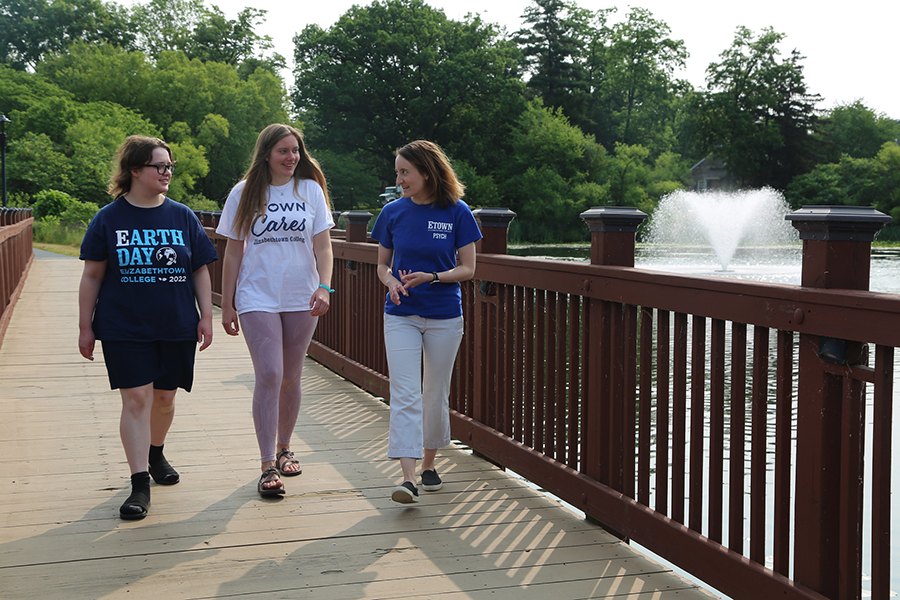A pair of Elizabethtown College students, Emma Halteman ’24 (Neuroscience major) and Catherine McMahan ’24 (Psychology major) are conducting a study this summer to determine if the stress levels of college students, as well as their attitudes toward the environment, can be impacted by how they engage with nature.
In addition to pre- and post-surveys that assess students’ stress, mood, and environmental attitudes and behaviors, participants either engage in an indoor or outdoor environmental educational activity or spend time meditating in nature. The outdoor educational activity involves a walk around the College’s beautiful Lake Placida. Participants learn to identify various plants along the way, an interdisciplinary aspect of the project that Etown Professor of Biology, Dr. Diane Bridge lent expertise.
Their work on campus is part of the Elizabethtown College Summer Creative Arts and Research Program (SCARP).
Title of Research
Examining the Impact of Environmental Education and Time Spent Outdoors on Students’ Stress and Environmental Attitudes
Student Researchers
Emma Halteman ’24 (Neuroscience major)
Catherine McMahan ’24 (Psychology major)
Faculty Mentor
Elizabeth Dalton, Assistant Professor of Psychology
What are you researching?
McMahan: We are examining the effects that being in the outdoors has on stress experienced by college students and whether an indoor or outdoor environmental educational activity influences attitudes toward the environment.
Why did you choose this topic?
McMahan: I chose this topic because I love the environment, and I find it interesting to see how the environment affects our mental well-being.
Halteman: I choose this topic because I wanted to learn more about the environment around campus and gain experience in developing an intervention.
What is the most interesting aspect of this research?
McMahan: The most interesting aspect of this research is preparing the environmental information for our intervention groups. I enjoy researching and learning new information about species of plants and animals and being able to identify them in nature.
Halteman: The most interesting aspect of this research has been developing the intervention and survey measures.
How has your faculty mentor helped you?
McMahan: Dr. Dalton is a tremendous help. Her expertise and wisdom guide us in conducting our research. She provides feedback to strengthen the quality of our work. She is professional, thoughtful, and caring.
Halteman: My mentor has helped me immensely with this project. She has pointed out many elements to consider with the project that I did not originally think of when I was either developing the intervention or the survey measures. Additionally, she has given a lot of extremely useful advice whenever I got stuck on a certain part of the project.
Hear from the faculty mentor – Elizabeth Dalton
“Prior research shows us that outdoor engagement, and specifically time spent outdoors that involves environmental education, is associated with more positive environmental attitudes,” Dalton said. “Additionally, there is considerable evidence that spending time outdoors can help to promote mental well-being. This study will help us to directly compare the impact of environmental education that takes place in an outdoor vs. indoor setting, as well as time spent outdoors that does or does not include environmental education, on students’ moods and environmental attitudes. This research will help clarify which elements of environmental education and outdoor engagement are most impactful.”

